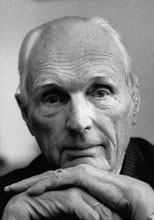- Bernard Lievegoed
Infobox Person
name = Bernard Lievegoed

image_size =
caption =
birth_date = Sep. 2, 1905
birth_place = Medan, Sumatra
death_date = Dec. 12, 1992
death_place = Zeist, Holland
education = Doctor of Medicine and Psychiatry
occupation = Psychiatrist, Consultant for Organizational Development, Writer
spouse =
parents =
children =Bernard Lievegoed (
2 September 1905 ,Medan -12 December 1992 ,Zeist ) was a Dutch medical doctor, psychiatrist and author. He is most famous for establishing a theory of organizational development. He founded the N.P.I., or Netherlands Pedagogical Institute, which works with organizations and individuals to help these realize their economic, social and cultural goals. He also founded the [http://www.vrijehogeschool.nl "Vrije Hogeschool"] , or Free University, inDriebergen .Life
Bernard Lievegoed was born in
Medan ,Sumatra (then theDutch East Indies ) in 1905. At nine, his family moved for three years toRotterdam inHolland . From 1917-22, Lievegoed attended high school in Java. In 1924, he began a study of medicine in Groningen, taking a doctorate in 1928. In this same year he first became aware ofanthroposophical remedial education; this encounter was to play a large role in his further development. In 1930 he completed the medical degree in Amsterdam and became a general practitioner inBosch in Duin (nearZeist ).In 1931 Lievegoed founded the [http://www.zonnehuizenveldheimstenia.nl Zonnehuis] , a home for children with disabilities, in Bosch in Duin. The Zonnehuis was later relocated to Zeist and, in the course of its expansion its name was changed to the "Zonnehuizen Veldheim Steinia te Zeist". Lievegoed was the director of this institution from its founding until 1954.
In 1932 Lievegoed helped to found the Vrije School (free Waldorf school) of Zeist. In 1939 he did a higher doctorate (promotion) with a thesis about the therapeutic use of music. In 1946 he published the first of a number of books, "Ontwikkelingsfasen van het kind"; this was translated into eight languages and appeared in English as "Phases of Childhood".
From 1948-1953 Lievegoed was a consultant for assistance to uneducated working-class children. During this time he published "Planetenwirken und Lebensprozesse in Mensch und Erde" ("Planetary Influences and Life Processes in the Human Being and the Earth"). In 1952 he cofounded the Vrij Geestesleven publishing house, oriented towards publishing works related to
spiritual science . He became a member of the national commission on technical high schools; he served in this capacity until 1962.In 1954 he founded an institution that became his life-work, the NPI. The original name, the Dutch Pedagogic Institute for Economics, was later changed to NPI: Institute for Organizational Development. He led this institute (in Zeist) for the next 17 years. In 1955 he became extraordinary professor for social pedagogy at the Dutch Economic College (now
Erasmus University inRotterdam . In 1961 he helped to found a new technical college in Twente (now Twente University), which opened in 1964. Here he served as professor of social economics and Dean of the Economics Department until 1973. During this time he supported the work of the "Kind en Instrument" Foundation, out of which the internationalChoroi instrument-making workshops arose, and founded an association for therapeutic educators.Between 1968 and 1976 Lievegoed was chair of a governmental commission on education that was given the task of transforming the educational system in Holland. During this time he published a number of works (titles are given in approximate English translation): "Organizational Development", "Social Structures in Therapeutic Education", "The Spiritual Impulse behind the Movement for Therapeutic Education", "Towards the 21st Century" and, together with his wife Nel Lievegoed-Schatborn, "Aspects of Therapeutic Education". In 1971 he founded an independent university, the
Vrije Hogeschool , in Driebergen. He was Dean of the University for the next eleven years.In 1973 he left Erasmus University to cofound and become the managing director of the "Vrije Pedagogisch Akademie", now "Hogeschool Helicon" (Helicon College). Over the next years, he published several more books: "Phases" ("De levensloop van de mens", translated into eleven languages), "Mystery Streams in Europe and the New Mysteries", and "Organic Architecture". He joined the governmental commission on
alternative medicine (1977-1981).In 1983 Lievegoed published a play ("De wadlopers", "The Marsh-Flats") and another book, "Man on the Threshold: Possibilities and Problems of Inner Development". He received a prize ("Gouden Ganzenveer", or Golden Goosefeather Prize) honoring his cultural contributions; this cited his complete works as the basis for the prize. Further publications: "Contemplations on the Foundation Stone" (1987), "About Cultural Institutions" (1988), "Through the Eye of the Needle" (1991) and "About the Salvation of the Soul" (published posthumously in 1993).
Lievegoed died on Dec. 12, 1992 in Zeist, Holland.
Books by Bernard Lievegoed
* "Man At the Threshold"
* "The Developing Organization"
* "Managing the Developing Organization"
* "Phases"
* "Phases of Childhood"
* "The Eye of the Needle"Links
* [http://www.bernardlievegoed.nl Bernard Lievegoed website in Dutch] (This includes the original Dutch titles of his works.)
* [http://biographien.kulturimpuls.org/detail.php?&id=381 Biographien Kulturimpuls Bernard Lievegoed]
Wikimedia Foundation. 2010.
